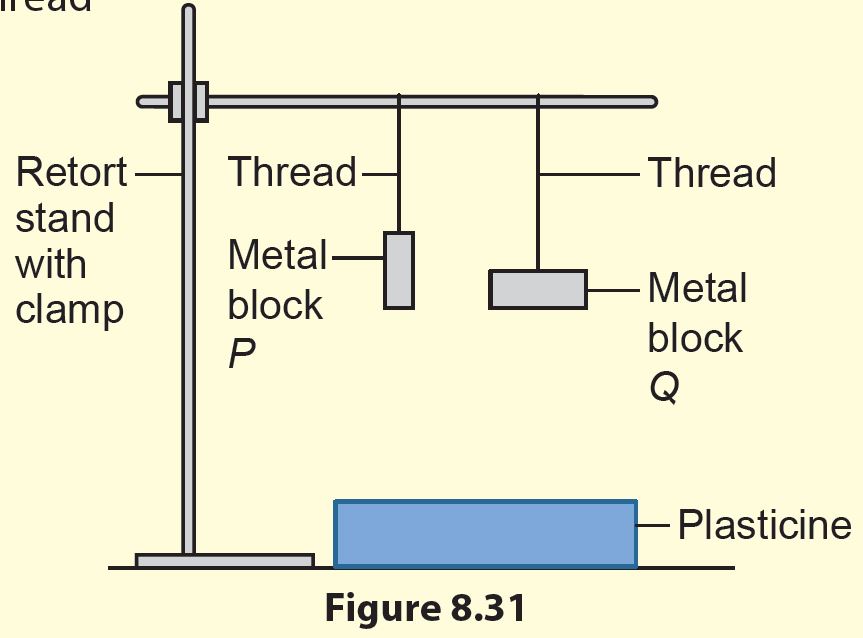Experiment 8.2:
Aim: To study the relationship between surface area and pressure.
Problem statement: What is the effect of surface area on pressure produced by the same force?
Hypothesis: The larger the surface area, the lower the pressure exerted.
Variables:
(a) Constant variable: Metal blocks of the same mass
(b) Manipulated variable: Surface area
(c) Responding variable: Depth of dent
Materials: Metal block and plasticine
Apparatus: Retort stand with clamp, metre rule and thread
Procedure:
1. Prepare two metal blocks of the same mass.
2. Hang the two blocks as shown in Figure 8.31.
3. Place a piece of plasticine under the two metal blocks.
4. Release metal block P and measure the depth of the dent produced using a metre rule.
5. Repeat step 4 using metal block Q.

Result:

Conclusion:
Is the hypothesis accepted? Give your reasons.
Questions
1. What is the change in depth of the dent produced when the surface area upon which the force is applied increases?
2. What is the relationship between surface area and pressure?
3. State an inference based on the observation.
4. State the operational definition of pressure.
Answer:
1. The depth of dent produced is less when surface area increases.
2. Surface area increases, pressure decreases.
3. Depth of dent formed by metal block P is larger than Q because metal block P exerts a higher pressure.
4. The operational definition of pressure is the depth of dent produced when two metal blocks of different surface areas drop on the plasticine.
Aim: To study the relationship between surface area and pressure.
Problem statement: What is the effect of surface area on pressure produced by the same force?
Hypothesis: The larger the surface area, the lower the pressure exerted.
Variables:
(a) Constant variable: Metal blocks of the same mass
(b) Manipulated variable: Surface area
(c) Responding variable: Depth of dent
Materials: Metal block and plasticine
Apparatus: Retort stand with clamp, metre rule and thread
Procedure:
1. Prepare two metal blocks of the same mass.
2. Hang the two blocks as shown in Figure 8.31.
3. Place a piece of plasticine under the two metal blocks.
4. Release metal block P and measure the depth of the dent produced using a metre rule.
5. Repeat step 4 using metal block Q.

Result:

Conclusion:
Is the hypothesis accepted? Give your reasons.
Questions
1. What is the change in depth of the dent produced when the surface area upon which the force is applied increases?
2. What is the relationship between surface area and pressure?
3. State an inference based on the observation.
4. State the operational definition of pressure.
Answer:
1. The depth of dent produced is less when surface area increases.
2. Surface area increases, pressure decreases.
3. Depth of dent formed by metal block P is larger than Q because metal block P exerts a higher pressure.
4. The operational definition of pressure is the depth of dent produced when two metal blocks of different surface areas drop on the plasticine.